Syed Talha Ahsan?is a British poet and translator. He has been imprisoned for seven years without a trial. The family is spending another Eid without him.
Continue reading “Eid without Talha. Held for seven years without trial.”
Musings by Shahidul Alam
Continue reading “Eid without Talha. Held for seven years without trial.”
But let me return to the central question: is it reasonable to claim that western governments were directly involved in the consortium project? That they were, as I argue, not only one of the constitutive elements, but the leading one?
Some may reply that the presence of the Coffee Group (generally known as the “Tuesday Club”), the frenzied activity of its members prior to the consortium coup, and after — settles the matter. That, the evidence of their activities is well-documented in both print and electronic media, that it is considerably strong, and that convictions on the basis of far less circumstantial evidence have been awarded by courts of law, ones that enjoy credibility.
A WikiLeaks leaked cable dated January 11, 2007 (Subject: Diplomats Coordinate Strategy On Bangladesh, Reference ID: 07DHAKA53), signed by Patricia Butenis, then US ambassador to Bangladesh, describes the Tuesday Club thus to her superiors in Washington, Continue reading “Part IV Military-installed caretaker govt, or a 'consortium' govt?”
Today, September 11, 2011, is the tenth anniversary of the attacks on New York city’s Twin Towers, and the Pentagon.

Eleven days after the attack, president Bush, in his address to a joint session of the Congress had said, the attacks were carried out by al Qaeda, a “collection of loosely affiliated terrorist organizations” because they hate our freedoms. Freedom of religion, speech, vote, and assembling and disagreeing with each other. Briefly put, a hatred for the American way of life. They kill not only to end lives “but to disrupt and end a way of life.” “They stand against us because we stand in their way” (September 20, 2001).
But?and I hope this will give grounds for thought to readers and friends, who still cling to the idea that Osama bin Laden was responsible for the attacks, for the deaths of three thousand innocent civilians?the Bush administration had decided by 11am, September 11, 2001 that al-Qaeda was responsible for the attacks. Prior to conducting an indepth police investigation.
That same evening, at 9:30pm, a War Cabinet, with a select number of top intelligence and military advisors, was formed. That very night, at 11:00pm, a mere 12 hours after Bush administrators had declared al Qaeda to be responsible, the `War on Terror’ was officially launched (Michel Chossudovsky, The Truth Behind 9/11, Global Research, September 11, 2008).
Less than 4 weeks later, Afghanistan was bombed and invaded. The occupation, as we know, continues. And US troops, as recent press reports indicate, may stay in Afghanistan until 2024. Continue reading “9/11, growing disbelief at US government's account a decade later…”
The questions in the Pakistani mind centre around the vast difference between an American life and a Pakistani one. There is furore over the US?s chest-thumping pronouncements about the supremacy of the law and then its flagrant violation in other countries
It is hip to hate sharia or Islamic law in the US. Many a Republican is jumping on the bandwagon and Representative Don Wells (R Cabool) even likens it to polio. That a CIA spy who killed two Pakistanis was freed because of it is quite ironic.
In late January, Raymond Davis was driving in a populated area of Lahore when he killed two Pakistanis, photographed their bodies and radioed for help wherein an American consular vehicle rushed to the scene, crushing a bystander to death in the process. Davis? car was loaded with arms and his cell phones showed contact with terrorist groups. Davis was arrested and started a diplomatic frenzy wherein the US maintained that he had diplomatic immunity and Pakistan?s foreign minister, Shah Mahmood Qureshi, was fired for not toeing the line, for he and his department maintained that Davis did not. Even President Obama invoked the Vienna Convention that confers diplomatic immunity insisting that Davis was an embassy employee. The Vienna Convention however confers diplomatic immunity in the pursuit of diplomatic duties and running around with unlicensed arms does not fall in that arena.
The American mantra did not change. For four weeks, under severe public pressure, the Pakistani government ran from pillar to post, frazzled but loathe to annoy its benefactor. And then someone had an epiphany: blood money or the qisas and diyat law.
Under sharia law, in the event of grievous injury or murder, the case must first go to court and a verdict pronounced. Thereafter, it is the victim?s family?s prerogative to either go with full retribution/an eye for an eye (qisas) or monetary compensation (diyat) with consequent forgiveness, or complete forgiveness with neither qisas nor diyat. The Qisas and Diyat Law has been part of Pakistan?s legal system for the last 30 years and the Federal Shariat Court specialises in cases of this nature. Monetary compensation is calculated in the case of murder as the cost of approximately 30,000 grams of silver.
In the Davis case, one of the victims? widows committed suicide and on her deathbed repeatedly said that she was killing herself as she was not getting justice and she wanted ?blood for blood?. The families of both of Davis? victims repeatedly said that they did not want compensation but justice.
Senator John Kerry visited Pakistan and CIA Director Leon Panetta visited President Zardari and Pakistan?s CIA counterpart, ISI Director General Ahmad Shuja Pasha a few weeks ago. Many a Pakistani antennae went up when David Ignatius wrote of the concept of blood money in The Washington Post.
Pakistan is famous for its bureaucracy and its maddening inefficiency. Yet, in a matter of two hours the attorneys for the victims? families were changed, their original attorneys detained, a one-by-one questioning of 18 family members by the judge about their compensation and forgiveness, and the whisking away of Davis to a waiting US Air Force jet at Lahore airport were all accomplished.
A total of $ 2.34 million was divided among the 18 family members, not by the US but some fund of the Pakistan government. The ingratiation of Zardari to the US is so complete that the vanity of the US was also kept in mind: no precedent was to be created in which the US might find itself paying blood money for its wayward spies. Foreign Policy magazine reports a Pakistani official as saying that the US promises to pay Pakistan back in the future.
The victims? families went into hiding for fear of public humiliation and were later tracked down by the media. The anger and outrage in Pakistan over Davis? hurried release is widespread and spans all sectors of society from students to lawyers.
Even relatively US-friendly scholars have clearly stated that the Qisas and Diyat Law was misapplied for the court should have given a verdict first. Religious scholars state additionally that Davis committed an act of terror against a nation and the Law of Qisas and Diyat does not apply in this case. An appeal against the disposition of this case has been filed with the Supreme Court of Pakistan. But the futility of that is obvious. It is all semantics now; Davis is gone.
The greater issue is what is raging in the Pakistani mind: the US?s flagrant double standards. In 1997, Mir Ajmal Kansi killed two CIA agents outside Langley, disappeared, surfaced in Pakistan and was handed over to the US by Pakistani authorities and executed. In 1995, Ramzi Yousef was extradited to the US by Pakistan, convicted of the 1993 World Trade Centre bombing and given two life sentences. In September 2010, another Pakistani, Dr Aafia Siddiqui, an MIT graduate and frail mother of two, was convicted in Manhattan of armed assault, carrying a firearm and three counts of assault on US officers and sentenced to 86 years in prison, essentially a life-term.
The questions in the Pakistani mind centre around the vast difference between an American life and a Pakistani one. There is furore over the US?s chest-thumping pronouncements about the supremacy of the law and then its flagrant violation in other countries. The sudden, suspicious release of Davis stokes the self-respect of the common Pakistani, entrenches anti-Americanism and catalyses extremism.
I am appalled at the wholesale caving in of the farcical Zardari government but it is a disaster on wheels; I know and expect it. It is primarily the US that I am so ashamed of and so scared for. It is not exporting peace, justice and democracy; it is just the super-bully of the world. With blinders on to boot. Pakistanis thought that the US would be forever grateful for Raymond Davis? miraculous exit and all kinds of overtures would occur to curb anti-American sentiments. The very next day American drones bombed northern Pakistan and killed 42 villagers. Thank you Pakistan, we will do it again.
Apnader naamte hobe, had said my friend.
We were discussing the Women Development Policy and both he and Nurul Kabir were astonished. Women’s organisations had not taken to the streets. They had not protested against Islami Oikyo Jote leader Mufti Fazlul Huq Amini’s fabrication, nor against the Awami League-led government’s shocking betrayal of women’s rights.?
The Policy contains anti-Islamic provisions, said Amini. Equal shares to inheritance are against the Quran and Sunnah, these should be scrapped, its implementation would destroy “family values and social norms.” It would encourage the “breakup of families and [lead to] illegitimate births” (bdnewslive, April 21, 2011).?
The lie was used by the Islami Ain Bastobayon Committee (Committee for the Implementation of Islamic Law, or ILIC) to call a daylong countrywide hartal, which, in all likelihood, benefitted the government. It gave credence to Sheikh Hasina’s allegation that the previous BNP-Jamaat led government (2001-2006) in which the IOJ was an alliance partner, had “smeared” the name of Islam, had turned the country into “a haven for terrorists and militants.” (I myself think that the situation is more complex than it is made to appear, for reasons which I’d mentioned previously: the ties between some of the militant Islamically-oriented parties and state intelligence agencies are unclear, as are the reasons as to why Sheikh Hasina has agreed to setting up the regional Counter-Terrorism Centre (for South Asia) in Dhaka, for which the European Union is reportedly providing 1.5 million euros along with technological assistance. And while we are on the topic, I think it’s worth mentioning that American soldiers recently landed at Dhaka airport in a special aircraft with “arms and tools.” According to news reports, they were `disarmed’ by airport customs; apparently, Bangladesh army personnel receiving them had been unaware of customs laws; hurriedly-dispatched home-ministry-authorised documents ensured the release of the armaments which had been brought by visiting US soldiers “to train [the] Bangladesh army” (New Age, April 21, 2011).?
Interestingly enough, Sheikh Hasina’s government seemed to assist the hartal. Summons’ and arrest warrants issued against Amini by a Dhaka court on March 31, 2011?sedition and defamation cases filed respectively by Sammilita Islami Jote, and Jananetri Parishad?were swiftly retracted by the magistrate on the advice of the chief metropolitan magistrate.? Being not under lock-and-key must have helped Amini organise the April 4 hartal.
Continue reading “Reflections on Women Development Policy and IOJ's hartal PART III”
[Today’s special piece is dedicated to two professors of international relations, Dhaka university, whom I had the pleasure of watching on private TV channels, responding to news of Osama bin Laden’s death. One of them, while replying to its expected impact on Muslim extremists, spoke (only) of the latter’s `distorted mindset’ while the other, more forthcoming, spoke of how the world was still a better place because of US leadership. Political naivete, I guess, has a certain overarching appeal. I will write exclusively on this some other day].
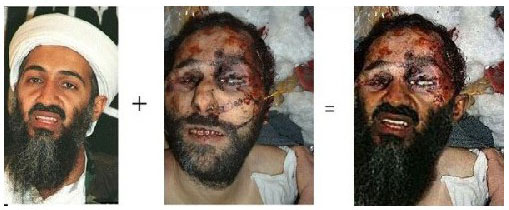
LiveLeak: AP retracts death photo of Bin Laden.
Justice has been done, declared US president Barack Obama, in a televised address to the nation on May 1 night. Osama bin Laden, leader of al Qaeda, has been killed. Years of painstaking work by the US intelligence community had led to a possible lead last August, which indicated that the “mass murderer”?whose organisation had carried out the “9/11 attacks,” who had “openly declared war on the United States”?was hiding away in Abbottabad, deep inside Pakistan. A small team of Americans had conducted the targeted operation. Bin Laden had been killed in the ensuing firefight. No Americans were harmed. No civilian casualties either. Senior administration officials offered more details in a subsequent press briefing: 3 adult males (Laden’s adult son, 2 male couriers) were also killed. As was a woman, who was used as a human shield by a combatant.
Continue reading “Resurrecting bin Laden, for the final kill”
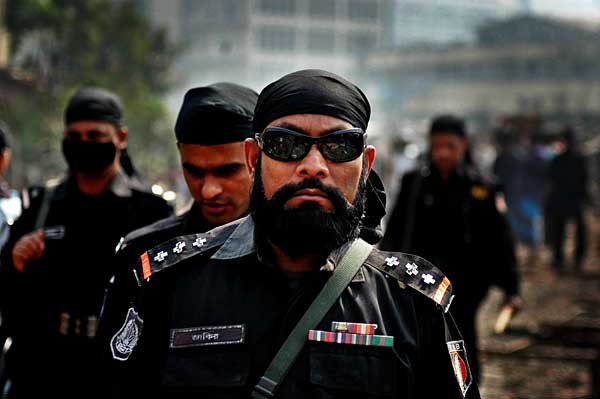
IT HAS been nearly two weeks since WikiLeaks leak of diplomatic cables from US Embassy, Dhaka revealed that US Ambassador James F Moriarty had urged the prime minister’s energy adviser, Tawfiq-e-Elahi Chowdhury, to award contracts to Asia Energy, Conoco Philips and Chevron.
As I argued in `WikiLeaks Bangladesh – I: People’s Resistance to Global Capital,? Govt Collaboration is Vindicated’ (December 27, 2010), subsequent events reveal that those in position, i.e. those within the government, complied. So did the opposition, by remaining silent. By not publicly disavowing policy decisions taken earlier.
A critical analysis of WikiLeaked diplomatic cables reveal a shared interest between the two major political parties and their respective leaders, Sheikh Hasina and Khaleda Zia, whose bitter political rivalry has led influential sections of both national and international media to dub them `battling begums.’
They reveal a shared interest between?and this probably evokes a sense of deep shame for the nation?the party which leads the nation’s desire for trying war criminals of 1971 (the Awami League), and leaders belonging to the party who are to be tried for having committed these crimes (the Jamaat-e-Islami Bangladesh).
The public is given to understand that the Awami League, Bangladesh Nationalist Party, and Jamaat-e-Islami are unlikely bed-fellows, but closer analysis reveals their unity in serving the interests of global capital, against the interests of impoverished, oppressed local communities in Phulbari, against asserting national control and ownership of mineral resources.
No official reaction to the WikiLeaked energy cable, still. Other expos?s seem more pressing. The creature comforts in Khaleda Zia’s Dhaka Cantonment home from which she was evicted. Signs of “opulence,” says Sheikh Hasina.
Meanwhile, the National Committee for the Protection of Oil, Gas and Mineral Resources, Power and Ports demands that the US ambassador be declared persona non grata, that the prime minister’s energy adviser be sacked (December 30, 2010).
Continue reading “WIKILEAKS BANGLADESH – II”
![]()
At a time when Bangladesh is being asked (against the wishes of its citizens) to send troops to Afghanistan, an interesting article on the complex forces that are at play in the region.
related article: Sitting on a man’s back
By MATTHIEU AIKINS
Published1 October 2010
CARAVAN
Matthieu Aikins is a journalist whose feature writing and photography have appeared in such US, Canadian, British and Indian publications as Harper’s Magazine, the Globe & Mail, the National Post, the Coast, the Toronto Sun, The Caravan, Progress Magazine, the Halifax Chronicle-Herald, the Kingston Whig-Standard, Bad Idea Magazine, SAIL Magazine, and on CBC’s ‘The National’ and Global TV’s ‘National News’.
THEY WERE BOTH YOUNG. One had just the first wisps of hair on his cheeks, like an adolescent. The other was not much older, his short-trimmed beard caked with dried blood. There were gaping exit wounds in his shoulder, and in the pale skin of his belly, where his undershirt had been pulled up to reveal the damage. The two boys were lying dead amongst scattered bricks, at the feet of a crowd of gaping onlookers and journalists, in an abandoned construction site in Kabul.
?Where do you think they?re from?? a reporter asked the policeman who was taking a picture of the bodies with his cell phone, his assault rifle dangling from his other hand. The glaze of adrenaline still shone on the cop?s cheeks and eyes. ?Pakistan,? he said. ?Definitely not Afghans.? They always say that here, as if you could tell. They looked like Pashtuns, at least.
It was just one of several attacks in Kabul this summer, unremarkable in its execution and impact, but as a result, a series of extraordinary events had been triggered that would serve as a bellwether of India?s waning influence in Afghanistan. It was 29 May, the first day of the National Consultative Peace Jirga, and the two militants had managed to set up in the empty site and fire rockets at the Polytechnic University, the site of the peace jirga?a carefully stage-managed event that had brought handpicked tribal elders and civil society figures to endorse President Hamid Karzai?s plan to reconcile with the Taliban.
Karzai was furious that the jirga had been disrupted, in the middle of his inaugural speech, no less. One of the rockets had severed the leg of one of his personal bodyguards, and the two attackers had held out for several hours in a gun battle with police before finally being shot to death.
The following week, Karzai called a meeting with Hanif Atmar, the Minister of the Interior, and Amrullah Saleh, the chief of the National Directorate of Security (NDS)? the Afghan intelligence service?where he accused them of deliberately failing to provide adequate security in order to undermine the jirga. In a heated exchange, both offered their resignations. It wasn?t the first time that either of them had offered their resignations in response to an angry outburst by Karzai, but this time the president accepted.
Continue reading “India in Afghanistan, Nation building or proxy war?”
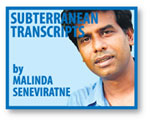
The 4th article of the Dasa Raja Dharma, Lord Buddha?s incomparable treatise on good governance is about Ajjava, i.e. honesty and integrity. The ruler, the Buddha said must be absolutely straightforward and must never employ any crooked means to achieve ends. This week I planned to dwell on this particular aspect of good governance but am compelled to employ the idea to dissect something more specific. I write about honesty and integrity but only in terms of how they relate to the month of September.
I am writing this on September 22, 2010. September 22 is significant for a specific and personal reason. It marks an anniversary. On this day, exactly one year ago, the Daily Mirror published an article by me titled ?Welcome to Sri Lanka Ms. Patricia Butenis?. Ms. Butenis had just assumed duties as the US Ambassador to Sri Lanka. My comment followed a statement she issued to the press subsequent to presenting credentials to President Mahinda Rajapaksa.
She said in that note, ?No country, including the United States, has a perfect record in safeguarding human rights? but said that even while addressing its own shortcomings, the USA has a responsibility to advocate for the rights and freedoms of people worldwide. Ms. Butenis is aware I am sure of the adage that charity begins at home. I expressed in my response to her ?note? the hope that once she recovers from jet-leg, Ms. Butenis would write a lengthy piece informing Sri Lankans about what exactly the USA has been doing by way of addressing shortcomings.
A lot has happened since September 22, 2009. We?ve had Nick Clegg of Britain?s Liberal Democratic Party confessing while acting as Prime Minister that the invasion of Iraq was illegal. We?ve had ?Wikileaks? telling us of the horrendous and systemic perpetration of atrocities by US troops in Afghanistan. We?ve had the US justice system virtually giving a green light to torture of prisoners as long as it happens outside the borders of that country. We?ve had President Barack Obama wanting photographic evidence of excesses perpetrated by US troops in Iraq suppressed in the name of ?national security?. We?ve not had Ms. Butenis saying a word about these things.
Continue reading “September 22 is for remembering”
Forget about the power that, according to Mao, flows from the Barrels of Guns!
A lot more power actually flows through the matte black barrels of lenses. Camera lenses! And this is a power that flows a lot more silently and, most of the time, it works it magic very subtly.
Very rarely do pictures explode on the media scene like the now infamous cover picture on the August 9th issue of Time magazine. Very rarely do pictures present us with such a questionable and ?teachable? moment about photography and its political uses. Rarely do photographs become such a powerful peg for discussions that go on and on. Discussions that need to go on because we have to understand, dissect and discuss the spaces that photography occupies in contemporary society. Spaces that are hardly any different from the times when photography was a medium controlled by the political and secret department of a British colonial government. Photography, we have to remember, was invented at a time when colonialism was at its height and became a major player in the colonial game. Something that British army cadets, who were to be posted in the colonies, were specially taught and equipped for.
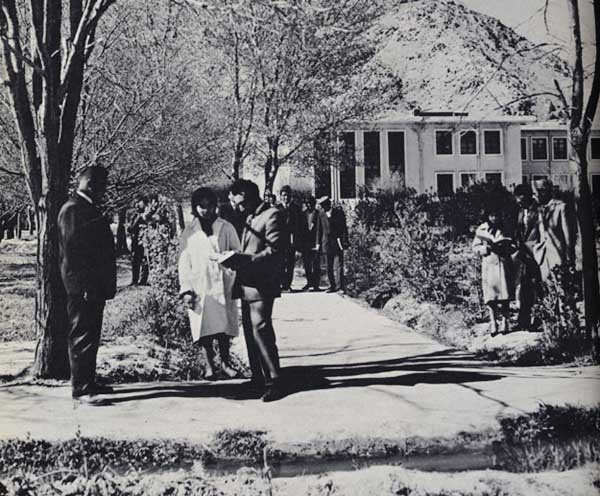
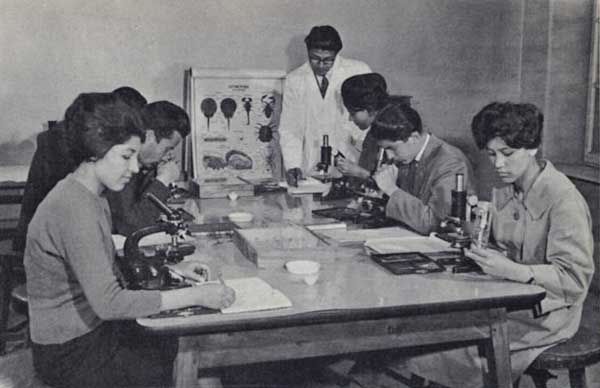
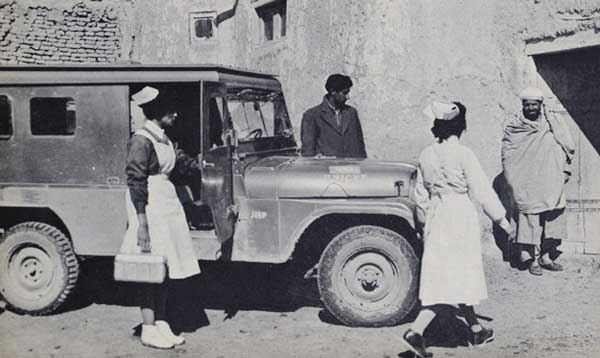
Photography is a powerful language, a valuable voice of authority for authorities. One has to understand how it is used. A ?Writing with Light?- Photo Graphy is becoming more powerful than any other human language. It is more than just the world?s first universally understood language, one that needs no translators and appears to have no word language limitations because it is a technology driven by newer and newer technologies which give it a reach and power that no language ever had.
The endless flow of camera constructed pictures is, today, increasingly constructing our social and political landscape. Constructing us, actually, by manipulating the mental spaces that we live in. Defining our Drishti – our perception and very sense of self ! There are, after all, more photographs shot every year than there are bricks in the world. And photography, in its different, camera lens based, avatars (film and television, for example) is what makes us what we are -who we are manufactured to be.
Cameras construct our worlds in ways that word oriented languages did not because the visual language they present us with is perceived to have credibility, a veracity and a connection to objective truth that words did not. Pictures are becoming the bricks that construct our contemporary, increasingly visual world. A world that can no longer just ban the making of pictures as it once did or tried to do. A world in which technologies drive the move away from the word driven and language riven cultures towards vast visual information landscapes that are increasingly becoming part of a real, war driven, information wars . Wars that are, says the Project for a New American Century, about Full Spectrum Domination.
Domination that is blatant about not allowing any challenges ??military, economic or cultural?. Domination that seeks ?control of all international commons including Space and Cyberspace, Culture not excluded? and is driven by never ending wars that see whole societies as a battlefield. A battlefield where – in the language of the US Marines? ?Fourth generation Warfare? ? ? the action will occur concurrently- throughout all participants depth , including their society as a cultural and not just as physical entity?. Special Human Terrain teams now work alongside the American Armed Forces. These anthropologists, ethnographers etc are uniformed cultural warriors. They are, very problematically, working in battlefields to understand and subvert cultures and peoples. Humanity is now a terrain to be controlled.
It is against this background of militrarised information and cultural control that one needs to look at the Time magazine cover. It was its founder, after all, who first projected the idea of the 20th century as ?An American Centrury?. Henry Luce founded a media empire to project his agenda. Time, Fortune, Life and even the March of Time film series served to mediate his synarchist ideas of corporate control of political power. That he was a member of Yale university?s secretive Skull and Bones society like so many other American leaders, only adds to ones suspicions of hidden agendas.
Continue reading “Power from the barrel of a lens”